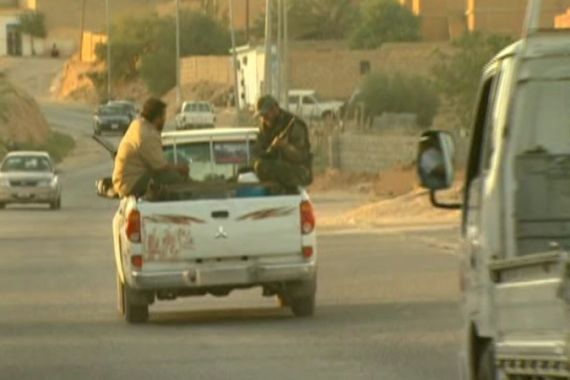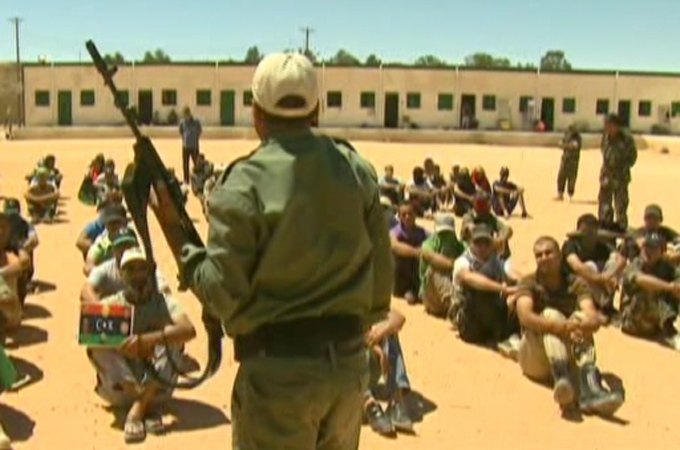Rebels make gains in western Libya
Fighters take town of al-Qawalish after six-hour battle and move closer to cutting supply route to capital.

 |
| Rebel fighters in the Nafusa Mountains, most untrained in warfare, may number at most a few thousand [Al Jazeera] |
Libyan rebels in the country’s western mountains advanced a dozen kilometres on Wednesday, seizing a town in another step toward securing a key north-south road that would open the way to the capital.
After a roughly six-hour battle that lasted throughout the morning, rebels drove forces loyal to leader Muammar Gaddafi from the town of al-Qawalish.
The two sides fought mostly at a distance, using heavy artillery, and black plumes of smoke could be seen rising from al-Qawalish in the afternoon, Al Jazeera’s Jonah Hull reported.
| Al Jazeera’s Jonah Hull reports on the capture of al-Qawalish by rebel forces |
“Gaddafi forces have fled the town and [the rebels] have now gone in on foot to try and make sure that that is the case, to try to clear it, to move house by house and see that in fact the area is clear of Gaddafi forces,” Hull said.
Al-Qawalish is around 50km west of Gharyan, the last city in the Nafusa Mountain range, which runs east from the border with Tunisia and has been controlled mostly by rebels since the uprising against Gaddafi broke out in mid-February.
Gharyan – still controlled by the regime – lies astride a major north-south highway that connects Tripoli, the coastal capital, with Sabha, a town in the southern desert that is held by Gaddafi’s forces and has been used to supply his troops and regime-held areas.
The rebel fighters in the Nafusa hope to take Gharyan and cut off Gaddafi’s supplies. From Gharyan, they can also mount an advance on the capital.
“The capture of the town of al-Qawalish is an important step in that direction,” Hull said. “The overall strategy of these fighters is clearly to reach Tripoli.”
But while rebel advances in tha Nafusa have been steady, they have also been slow, and the fighters must now take 50km of Gaddafi-held territory to reach Gharyan.
Largest demonstration yet held in Benghazi
As rebels scored military victories in the western mountains, their compatriots in the rebel-held cities of Misrata and Benghazi staged huge demonstrations to show their support.
Tens of thousands of opposition supporters filled the streets of Benghazi, the de facto rebel capital in the east, holding anti-Gaddafi caricatures and shouting “Go Gaddafi go” and “God is great”.
A helicopter, its shiny surface plastered with Libya’s monarchy-era tricolour flag, hovered low above the crowd. Some fired their AK-47 rifles into the air in jubilation.
A smaller demonstration was held in Misrata, which broke out of a loyalist siege in May but still endures near-daily rocket attack.
The coordinated shows of support were meant to counter a pro-regime demonstration held in Tripoli last Friday, which saw an enormous crowd take to the capital’s streets waving Gaddafi’s all-green flag.
Civilians killed in Misrata
East of Tripoli, in the rebel-held city of Misrata, at least 11 people were killed and dozens more wounded on Tuesday in an artillery barrage launched by Gaddafi forces, according to rebel sources.
The shelling marked another bloody day for a city that has been bombarded continually since March.
Sources said five rebels were killed in fighting at the western entrance to the city earlier in the day.
As the rebels fought in Misrata, French Defence Minister Gerard Longuet appeared to question their chances of defeating Gaddafi’s troops while also saying they no longer needed help.
The rebels have a “growing capacity to organise politically and militarily” but are “currently not in a stabilised, centralised system”, Longuet said.
Yet Longuet said rebels were no longer in need of controversial French weapons drops.
“There is emerging a political order distinct from that of Tripoli. The [rebel] territories are organising their autonomy… That is why the parachute drops are no longer necessary,” he said.
On the conflict’s eastern frontline, a rebel representative said nine Gaddafi soldiers were captured between Ajdabiya and Brega.
Diplomacy continues
Despite the ongoing violence, diplomatic negotiations are continuing over a possible solution to the conflict, though no proposal appears to have gained much traction.
An unnamed senior Russian official was quoted on Tuesday as saying Gaddafi would consider stepping down under certain circumstances. His departure, if realised, would meet the rebels’ central demand.
“The colonel is sending signals that he is ready to cede power in exchange for security guarantees,” the daily Kommersant newspaper quoted the official as saying.
The Russian source added that France appeared to be the country most willing to play a part in Gaddafi’s potential transfer of power. He said Paris could choose to unfreeze some of the Gaddafi family’s accounts and promise to help him avoid trial at the International Criminal Court in The Hague.
The rebels have rejected any proposed deal that would leave Gaddafi in power.
Preparations were under way for an international meeting on Libya in Istanbul on July 15-16. Mahmud Jibril, the NTC’s chief of staff, held talks with officials from Turkey and the United Arab Emirates on Tuesday.
Recep Tayyip Erdogan, the prime minister of Turkey, whose country is NATO’s sole Muslim-majority member and an influential regional player, has called on Gaddafi to cede power and leave Libya.
NATO looks to UN
This month’s meeting comes as diplomats debate what post-Gaddafi Libya might look like, with many hoping to avoid the chaos left in post-conflict Iraq or Afghanistan.
Anders Fogh Rasmussen, the NATO chief, said on Tuesday that the alliance would like to see the United Nations assume the leading role in Libya’s transition to democracy in the event Gaddafi leaves power.
“To accommodate the legitimate aspirations of the Libyan people, it is necessary that Gaddafi leaves power,” Rasmussen said. “After that, it is necessary to ensure a transition to democracy … We want the United Nations to take the lead in this effort.”
Rasmussen is to meet Libyan opposition members in Brussels next week the rebels’ first invitation to NATO headquarters, an alliance diplomat said on Tuesday.